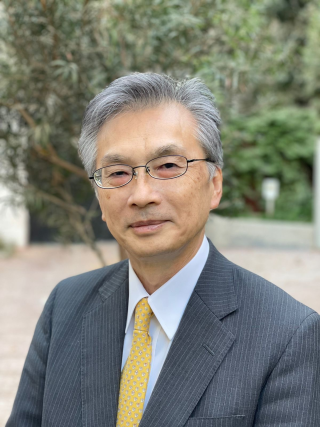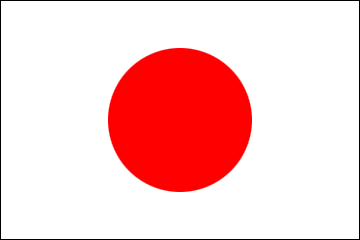Greetings from Ambassador OKA
2021/12/16

First of all, I would like to thank you for visiting the website of the Japanese Embassy in Egypt.
I am Oka Hiroshi, the new Ambassador of Japan to Egypt, and started my tenure on November 21st.
I had lived in Cairo for a year in 1983. "Whoever drinks from the Nile water must return to it again," as this famous Egyptian saying goes, I am excited to be able to stand beside the Nile River again after an absence of forty years. The first thing that I noticed in Cairo was that the kindness and generosity of Egyptians who love Japan have not changed.
Egypt has made remarkable progress during this period. After experiencing the Arab Spring in 2011, the Egyptian economy had regained its stability under the presidency of President Al Sisi thanks to the bold economic reforms he strenuously implemented. As a result, the Egyptian economy has continued to grow positively to this day, including even during the difficult circumstances of the Corona crisis.
For example, the desert highway leading to Alexandria has been marvelously built with four lanes of traffic in each direction. This year, the National Museum of Egyptian Civilization was opened in the city of Fustat, on the outskirts of Cairo. In this museum, when you are closely looking at the mummy of King Ramses II, which dates back to five thousand years ago, you would lose the sense of time. Next year, Egypt will host the Conference of the Parties on Climate Change “COP 27”. The wind turbines that Japan is working to operate for generating and supplying electricity are indispensable for the daily livelihood of Egyptians and their industries.
I would also like to commend the multi-layered cooperation that is ongoing between Japan and Egypt, including the business sector. In the regard, I am deeply appreciative of the dedicated efforts by all the parties involved to advance the bilateral cooperation, even under the difficult circumstances due to the pandemic. In order to support all of your efforts, the Embassy of Japan in Cairo will continue its best efforts to share with you relevant information, including those related to the pandemic.
Japan has continued to work with the Egyptians for many cooperation, which has stuck in the hearts and minds of the Egyptians. For example, the "Specialized Children's Hospital of Cairo University", which is called the "Japanese Hospital" after Japan, and the "Egyptian Opera House", which is now a base for the dissemination of culture in Cairo. The "Peace Bridge", which was built as the first suspension bridge over the Suez Canal, is a symbol of peace in this region, where four wars had been fought in the past. Japan is now contributing to constructing the "Grand Egyptian Museum", which symbolizes the pride of the Egyptians, together with its efforts to preserve and restore precious antiquities inside this museum.
Of particular note is the ongoing cooperation in the field of education. Japanese-style education has been introduced and promoted at all levels, from higher education to kindergarten, within the framework of the “Egyptian-Japanese Partnership for Education” and with the strong support of President Al Sisi, who admired the Japanese education during his visit to Japan in 2016. In a modern campus at the Egyptian-Japanese University of Science and Technology (E-JUST), nearly 2,000 promising young students, mostly Egyptians and including scholarship students from more than 10 African countries, are receiving Japanese-style education in engineering and science. E-JUST was opened in 2010 in Madinet Borg El Arab, a suburb of Alexandria and its campus building was designed by a famous Japanese architect.
Egypt's stability and prosperity is of pivotal importance to the stability and prosperity of the entire Middle East region. Egypt is therefore an important strategic partner for Japan. In August of 2021, then Japan's Foreign Minister Motegi Toshimitsu visited Egypt and agreed with his counter part, Egyptian Foreign Minister Sameh Shoukry to strengthen bilateral relations in all fields such as politics, economy, security, education and culture as well as to work together for the stability and the prosperity of the Middle East.
This progress and development in the cooperation between the two countries has been made possible thanks to the strenuous efforts by all the parties involved over the course of many years. The Embassy of Japan in Cairo would like to pay its deep respect for their efforts and will continue to work with all the people concerned so that the cooperation between Japan and Egypt will bear more fruit in the future as well. I will highly appreciate your continued support and cooperation in this regard. Thank you all, with all due respect and appreciation.
I am Oka Hiroshi, the new Ambassador of Japan to Egypt, and started my tenure on November 21st.
I had lived in Cairo for a year in 1983. "Whoever drinks from the Nile water must return to it again," as this famous Egyptian saying goes, I am excited to be able to stand beside the Nile River again after an absence of forty years. The first thing that I noticed in Cairo was that the kindness and generosity of Egyptians who love Japan have not changed.
Egypt has made remarkable progress during this period. After experiencing the Arab Spring in 2011, the Egyptian economy had regained its stability under the presidency of President Al Sisi thanks to the bold economic reforms he strenuously implemented. As a result, the Egyptian economy has continued to grow positively to this day, including even during the difficult circumstances of the Corona crisis.
For example, the desert highway leading to Alexandria has been marvelously built with four lanes of traffic in each direction. This year, the National Museum of Egyptian Civilization was opened in the city of Fustat, on the outskirts of Cairo. In this museum, when you are closely looking at the mummy of King Ramses II, which dates back to five thousand years ago, you would lose the sense of time. Next year, Egypt will host the Conference of the Parties on Climate Change “COP 27”. The wind turbines that Japan is working to operate for generating and supplying electricity are indispensable for the daily livelihood of Egyptians and their industries.
I would also like to commend the multi-layered cooperation that is ongoing between Japan and Egypt, including the business sector. In the regard, I am deeply appreciative of the dedicated efforts by all the parties involved to advance the bilateral cooperation, even under the difficult circumstances due to the pandemic. In order to support all of your efforts, the Embassy of Japan in Cairo will continue its best efforts to share with you relevant information, including those related to the pandemic.
Japan has continued to work with the Egyptians for many cooperation, which has stuck in the hearts and minds of the Egyptians. For example, the "Specialized Children's Hospital of Cairo University", which is called the "Japanese Hospital" after Japan, and the "Egyptian Opera House", which is now a base for the dissemination of culture in Cairo. The "Peace Bridge", which was built as the first suspension bridge over the Suez Canal, is a symbol of peace in this region, where four wars had been fought in the past. Japan is now contributing to constructing the "Grand Egyptian Museum", which symbolizes the pride of the Egyptians, together with its efforts to preserve and restore precious antiquities inside this museum.
Of particular note is the ongoing cooperation in the field of education. Japanese-style education has been introduced and promoted at all levels, from higher education to kindergarten, within the framework of the “Egyptian-Japanese Partnership for Education” and with the strong support of President Al Sisi, who admired the Japanese education during his visit to Japan in 2016. In a modern campus at the Egyptian-Japanese University of Science and Technology (E-JUST), nearly 2,000 promising young students, mostly Egyptians and including scholarship students from more than 10 African countries, are receiving Japanese-style education in engineering and science. E-JUST was opened in 2010 in Madinet Borg El Arab, a suburb of Alexandria and its campus building was designed by a famous Japanese architect.
Egypt's stability and prosperity is of pivotal importance to the stability and prosperity of the entire Middle East region. Egypt is therefore an important strategic partner for Japan. In August of 2021, then Japan's Foreign Minister Motegi Toshimitsu visited Egypt and agreed with his counter part, Egyptian Foreign Minister Sameh Shoukry to strengthen bilateral relations in all fields such as politics, economy, security, education and culture as well as to work together for the stability and the prosperity of the Middle East.
This progress and development in the cooperation between the two countries has been made possible thanks to the strenuous efforts by all the parties involved over the course of many years. The Embassy of Japan in Cairo would like to pay its deep respect for their efforts and will continue to work with all the people concerned so that the cooperation between Japan and Egypt will bear more fruit in the future as well. I will highly appreciate your continued support and cooperation in this regard. Thank you all, with all due respect and appreciation.
Ambassador Extraordinary and Plenipotentiary of Japan to Egypt
Oka Hiroshi
Oka Hiroshi
